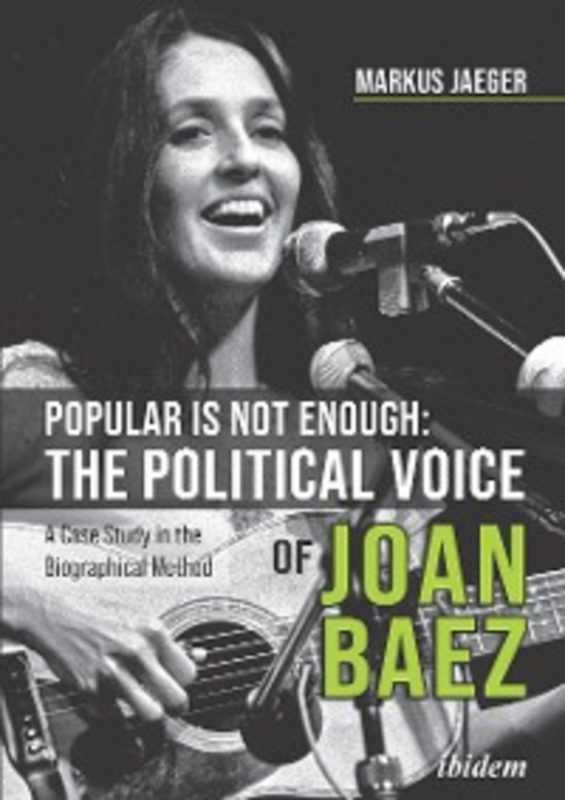
Joan Baez and her impact on politics and human rights
 The full title of this book: “Popular is Not Enough: The Political Voice of Joan Baez. A Case Study In The Biographical Method” will give you a clue. Yes, it is about Joan Baez but it is also very much an academic book that seeks to prove that the singer’s artistic endeavours are matched by genuine political and social influence. Whilst, like me, you might be reasonably conversant with her early years, what this book demonstrates is that Baez has been politically active throughout her life, all over the world, right up to the debacle of the Trump ‘government’.
The full title of this book: “Popular is Not Enough: The Political Voice of Joan Baez. A Case Study In The Biographical Method” will give you a clue. Yes, it is about Joan Baez but it is also very much an academic book that seeks to prove that the singer’s artistic endeavours are matched by genuine political and social influence. Whilst, like me, you might be reasonably conversant with her early years, what this book demonstrates is that Baez has been politically active throughout her life, all over the world, right up to the debacle of the Trump ‘government’.
I always found Baez’s voice a little shrill. She may be deemed a songwriter but her most notable performances are of other people’s work. However, her early career spawned a number of gold records, a clear measure of her popularity. There are those with a different view; Robert Shelton of the New York Times loved, “That superb soprano voice, as lustrous and rich as old gold (which) flowed purely ….. with a wondrous ease. Her singing (unwound) like a spool of satin”.
Whatever view you take, you can’t deny what Baez has achieved regarding human rights over many years – as generously evidenced in this book.
In terms of prejudice, Baez had an early double dose by way of her Mexican father (who declined a lucrative job in the armaments industry due to his pacifist views) and her own bisexuality. Thus she became actively engaged in relation to issues of racism and gay rights.
Baez came from a Quaker background, beliefs brought to the family by her mother and which account for her non-violent approach to activism. Time spent in Iraq (the family travelled extensively because of her father’s work) at the beginning of the ’50s opened her eyes to extreme suffering and poverty. Martin Luther King and Ira Sandperl (both espousers of non-violence) were two significant formative figures in a line traced from the writings of Thoreau via the actions of Gandhi to the present.
The book starts with a lengthy discussion around the theorising of Theodor W Adorno; described variously as a snob, difficult to understand (even for those of a like mind and training), and one of the most important social critics in post Second World War Germany.
Adorno, aided and abetted by Max Horkheimer, was a German philosopher, sociologist, psychologist, musicologist, and composer known for his critical theory of society. A central premise of his thinking about the ‘Culture Industry’, was that popular culture is akin to a factory producing standardized cultural goods – films, radio programmes, magazines and the like. These are used to manipulate mass society into passivity whilst ignoring wider social ills. In his view, even though this consumable culture might involve a degree of protest it makes no difference; it is still part of the same Industry.
So, it would follow, in Baez’s case that she used the tools of the entertainment industry (and her own stardom) to mass-produce product that in its own way served to promote acceptance and passivity – despite the pressing social problems and issues that she raised. Adorno believes that ‘High Art’, whatever that may be, does not have these pitfalls (hence presumably, the accusations of snobbery?).
Jaeger disagrees and presents a convincing case for Baez being at the formative edge of much social change and protest, making a big impact by her presence. His view is that it is inaccurate scientific subjectivity to see popular culture as,
‘Nothing but a derivative of high-culture for low-minded masses’.
Further emphasising the point, Jaeger refers to Rolling Stones contention that music and politics are linked in Baez’s work and “So intertwined that it is hard to assess her impact solely on aesthetic grounds”.
And yet, conversely, Adorno might have a point. For all the protesting that went on in the ’60s, where are we now and what has been achieved? In a time of social retrenchment Black Lives don’t seem to matter, right-wing authoritarian politics are in the ascendency and there is shrinking tolerance of diversity. Oppressive global economics hold sway and the conservative reactionary right gets ever stronger. And that’s not to mention the environment – we really don’t need sunglasses for that future.
Baez, as a schoolgirl, refused to engage with the farcical charade that hiding in a cellar or under a school desk meant nuclear attack was survivable. This was no doubt based on her father’s knowledge but it resulted in her being featured in the local press and labelled a communist. It seems laughable now but I doubt it was then?
Jaeger charts a path from that incident through the singer’s involvement in campaigns for Civil Rights, Free Speech and opposition to the Vietnam War in the 1960s.
He recounts the universal power of song in the story of Chilean Victor Jara, singing encouragement even after his fingers were cut off and just before he was beaten to death. He also describes the response in Spain in the late ’70s (only just post Franco and a potentially dangerous time) as Baez sings ‘No Nos Moveran’ in tribute to Dolores Ibarruri, La Pasionaria, the leftist heroine of the civil war. Baez was told that she, “Had broken a spell or perhaps broken through a layer of protective silence that still surrounded the great, though entombed Generalissimo Franco…… Fresh strength was lent to, and derived from, the ghostly memories of the armies of the poor”.
Additionally, during the seventies, Baez championed the rights of political prisoners and Amnesty International (founding her own similar organisation) as it grew in America. She spoke out for Gay Rights and continued to take an interest in Vietnam after the war. Being politically neutral, Baez was happy to challenge all sides and chose to berate the communist government in Vietnam after the war when, “She organized the May 30, 1979, publication of a full-page advertisement (published in four major U.S. newspapers) in which the communists were described as having created a nightmare”.
The point is made that until she came out in support of Obama, before his first election, Baez was apolitical (a stance she subsequently wished she had maintained), although she would probably always be seen as a child of the left, “Through all those years, I chose not to engage in party politics”.
In the ’80s – referred to quite appropriately by Jaeger as the ‘Narcissistic Age’, Baez was active in Latin America, after the death of Archbishop Romero in El Salvador. In Poland, she met Lech Walesa and, whilst in Czechoslovakia, she met and supported Vaclav Havel during the Velvet Revolution. He was of the view that the, “Revolution had a number of steps that were in some way preparatory states. One of these was….. the Joan Baez concert in Bratislava”.
In 1993, at the invitation of Refugees International and sponsored by the Soros Foundation, Baez travelled to the war-torn Bosnia and Herzegovina region of former Yugoslavia. She was the first major artist to perform in Sarajevo after the outbreak of the Civil War. Musician Vedran Smailovic recalls, “Not many people gave us Sarajevan artists such huge support and fuelled us with new energy to continue with our work”.
It is a burgeoning list from an extensive career that continues in the 2000s with Baez’s opposition to the Iraq wars and her alliance with Cindy Sheehan’s very personal protests against George W Bush and the conflict he oversaw.
The final chapter of the book (an addition to an earlier edition) considers, briefly, the time of Trump – about which the definitive books are certainly still to be written. The song, ‘Nasty Man‘, is considered to be aimed at the ex-politician
There are many more similar events – often impromptu after having been refused permission to perform elsewhere – in situations of threat and potential violence. The cynic might say that Baez must have clocked up a lot of air miles but what Jaeger does, in a book copiously referenced, is write about what those in situ made of Baez’s appearances in their conflicted corners of the world. It seems that many thought that she made a big difference.
At times this is quite a riveting tale – though the writer’s emphasis is not on producing a gripping narrative – which provides an overview of the life of a committed activist. The book is not always an easy read and there are times when it becomes a little repetitive and the language cumbersome, “When artistic expression engages with political activism, unavoidably arising doubts tend to result in forthright lack of differentiation”.
The fifty pages of introduction, setting out the thoughts of Adorno among others, are no doubt central to Jaeger’s purpose but they do make hard going and may dissuade a wider audience from continuing further. This section might have been better as an appendix at the end rather than the beginning of the book. Adorno’s basic premise is not complex and could be stated, and challenged, briefly. The reader would then start with the reality of Baez and her life, a more engaging read.
This may be a book more for sociologists than music lovers, spending as it does little time actually talking about the music itself – it’s the impact of the music and the artist which is the focus. You won’t know who was in the band, what guitars were played or who made a guest appearance – but if you want to know what people thought of Baez’s presence and her wider impact channeled through her art – then there’s a lot to read here.
“I went to jail for 11 days for disturbing the peace; I was trying to disturb the war”.


